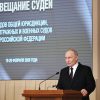
A senior member of Robert Mueller’s team says the special counsel was too timid in his investigation of Donald Trump and his links to Moscow during the 2016 election campaign.
HR McMaster was ‘surprised and disappointed’ at Trump claim Putin didn’t interfere in election
Read more
“We could have done more,” the prosecutor Andrew Weissmann writes in a book, Where Law Ends, which will be published next week.
Weissmann’s title is taken from an inscription on the front of the Department of Justice in Washington, which is taken from the philosopher John Locke: “Where law ends tyranny begins.”
Weissmann says Mueller and his top deputy, Aaron Zebley, avoided steps that would lead to confrontation with the White House, including subpoenas for financial records and interviewing the president and members of his family.
“Repeatedly during our 22 months in operation,” Weissmann writes, according to the Atlantic, “we would reach some critical juncture in our investigation, only to have Aaron say that we could not take a particular action because it risked aggravating the president beyond some undefined breaking point.”
Weissmann says Mueller was afraid of being fired.
According to the New York Times, he writes: “Had we used all available tools to uncover the truth, undeterred by the onslaught of the president’s unique powers to undermine our efforts? I know the hard answer to that simple question: we could have done more.”
The Times also said Weissmann “elevates” striking details arising from Mueller’s work, “for example, that the same business account that sent hush payments to an adult film star who alleged an extramarital affair with Mr Trump also received ‘payments linked to a Russian oligarch’.”
Trump denies the affair. Mueller passed investigation of the payments to Stormy Daniels, made by Trump lawyer Michael Cohen, to authorities in New York. Cohen, who has now published his own Trump book, served jail time.
The special counsel’s report was released in April 2019. Weissmann said the Senate intelligence committee’s Russia report, released last month, “was better”.
“It made judgments and calls,” he told the Atlantic, “instead of saying, ‘You could say this and you could say that.’”
The Senate report ran to 1,000 pages and laid out contacts between Trump and Moscow including links between a Russian agent and campaign manager Paul Manafort, and Trump ally Roger Stone’s close links to WikiLeaks and likely briefing of the candidate.
Weissmann led the prosecution of Manafort, who was sentenced to more than seven years. Stone was sentenced to 40 months – a punishment later commuted by Trump.
When the Senate report was released, Scott Horton, a lecturer at Columbia law school, told the Guardian: “The committee offers a much deeper view into the intelligence collected by US authorities than does the much sketchier Mueller report. It will support the view that Mueller, far from exonerating Trump, simply expected to pass the baton to Congress to conduct deeper inquiries.”
Mueller, a former FBI director, told Congress he did not exonerate Trump. He also repeatedly stated that he worked according to a DoJ standard which says a sitting president cannot be indicted.
Mueller did not establish a criminal conspiracy between Trump and Moscow, but did lay out extensive contacts between the campaign and Russia and numerous instances of possible obstruction of justice.
Of attorney general William Barr’s infamous summary of Mueller, favorable to Trump and delivered before the report was public, Weissmann writes: “Barr had betrayed both friend and country.”
Mueller did not pursue an in-person interview with Trump. In his bestseller Fear, Bob Woodward famously quoted lawyer John Dowd as saying he did not want his client to sit down with the special counsel because the president was “a fucking liar”.
Weissmann writes that Mueller simply wanted to avoid confrontation.
“The spectre of our being shut down exerted a kind of destabilising pull on our decision-making process,” he writes, according to the Atlantic.
Speaking to the magazine, Weissmann added: “There’s no question I was frustrated at the time. There was more that could be done that we didn’t do.”
He said he did not blame Mueller alone.
“I wouldn’t phrase it as just Mueller,” he said. “I would say ‘the office’. There are a lot of things we did well, and a lot of things we could have done better, to be diplomatic about it.”























































Свежие комментарии